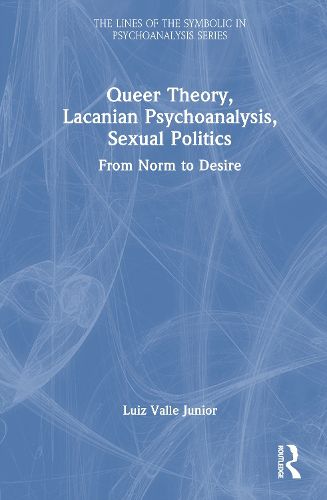Readings Newsletter
Become a Readings Member to make your shopping experience even easier.
Sign in or sign up for free!
You’re not far away from qualifying for FREE standard shipping within Australia
You’ve qualified for FREE standard shipping within Australia
The cart is loading…






Queer Theory, Lacanian Psychoanalysis, Sexual Politics is a consideration of the relationship between LGBTQIA+ politics, Lacanian psychoanalytic theory, and queer theory.
The book argues, through readings of Judith Butler's Gender Trouble and Lee Edelman's No Future, that core queer categories - such as normativity and anti-normativity - sidestep questions that are crucial not only to contemporary sexual politics but also to psychoanalytic thinking and clinical work. Luiz Valle Junior attends to the queer account of the political shortcomings of the contemporary LGBTQIA+ movement, as well as to the inadequacies of the queer reception of Lacanian psychoanalysis and makes a case for the ongoing relevance of Lacanian psychoanalysis to thinking through a renewed sexual politics. The book reflects on the potentiality of a Lacanian theory of sexual politics to challenge the dominance of identity in contemporary LGBTQIA+ activism and in the queer theoretical archive. Valle Junior shifts the discussion of sexual politics from the terrain of normativity and identity to the terrain of desire and enjoyment, and questions enduring heteronormative positions that contemporary Lacanians continue to espouse, against Lacan's own position.
Queer Theory, Lacanian Psychoanalysis, Sexual Politics will be of great interest to academics and scholars of queer studies, psychoanalysis, and in the LGBTQIA+ movement, and more broadly in the relation of identity analytics to contemporary psychoanalytic and political thought.
$9.00 standard shipping within Australia
FREE standard shipping within Australia for orders over $100.00
Express & International shipping calculated at checkout
Queer Theory, Lacanian Psychoanalysis, Sexual Politics is a consideration of the relationship between LGBTQIA+ politics, Lacanian psychoanalytic theory, and queer theory.
The book argues, through readings of Judith Butler's Gender Trouble and Lee Edelman's No Future, that core queer categories - such as normativity and anti-normativity - sidestep questions that are crucial not only to contemporary sexual politics but also to psychoanalytic thinking and clinical work. Luiz Valle Junior attends to the queer account of the political shortcomings of the contemporary LGBTQIA+ movement, as well as to the inadequacies of the queer reception of Lacanian psychoanalysis and makes a case for the ongoing relevance of Lacanian psychoanalysis to thinking through a renewed sexual politics. The book reflects on the potentiality of a Lacanian theory of sexual politics to challenge the dominance of identity in contemporary LGBTQIA+ activism and in the queer theoretical archive. Valle Junior shifts the discussion of sexual politics from the terrain of normativity and identity to the terrain of desire and enjoyment, and questions enduring heteronormative positions that contemporary Lacanians continue to espouse, against Lacan's own position.
Queer Theory, Lacanian Psychoanalysis, Sexual Politics will be of great interest to academics and scholars of queer studies, psychoanalysis, and in the LGBTQIA+ movement, and more broadly in the relation of identity analytics to contemporary psychoanalytic and political thought.